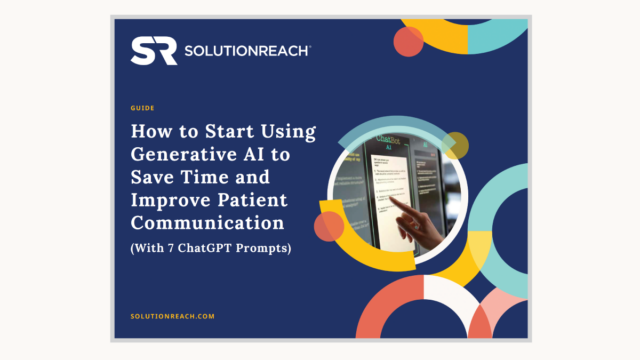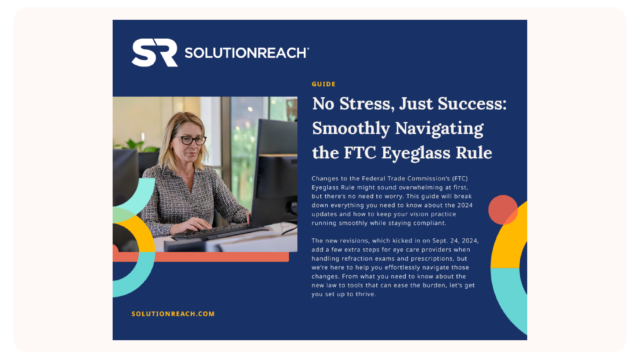We keep hearing about self-service patient communication tools like online scheduling being all the rage. But is online scheduling just a passing fad, or are patients increasingly wanting it? Is there a business case for offering your patients options for booking their healthcare appointments?
Let’s dive into this topic, separate fact from fiction, and see to what extent patients want their medical, dental, or vision practice to offer online scheduling/request an appointment amenities.
How popular is online patient scheduling among healthcare patients?
Among American consumers, a whopping 60% typically use online scheduling to book their appointments. That means only 33% of people make phone calls to schedule a service.
But when you peel back the onion further, it’s emphatically clear that patients themselves increasingly want practices to offer online appointment scheduling. And while younger patients may be the largest segment of patients embracing online scheduling, there’s also ample evidence that appointment booking options are becoming exponentially more important to all age groups.
To no one’s surprise, 99% of millennials and 97% of Gen Xers say they would use self-service scheduling if offered. But not too far behind, 92% of Baby Boomers would also use online scheduling if it were offered.
In actual use of self-service scheduling technology:
- 80% of millennials have used online scheduling; 19% haven’t but would if it were available.
- 69% of Gen X have used online scheduling; 28% haven’t but would if it were offered.
- 55% of Baby Boomers have used online scheduling; 32% haven’t but would if it were available.
There’s no question that millennials and Gen Z are going to be the next big market for healthcare practices. Not only are 76% of millennials more likely to choose a provider who offers online scheduling, but they’re also often labeled as our most “health-conscious” generation. Throw in younger generations’ affinity for self-service technology and the fact that millennials and Gen Z now comprise 42% of the U.S. population, and the business case for self-service scheduling becomes a no-brainer.
Why do so many patients prefer online scheduling?
Obviously, generational trends are a big factor. While younger adults are more prone to want digital means to book a visit, Gen X and Baby Boomers are quickly closing that gap.
Second, patients in recent decades have gotten used to easily going online to book appointments with businesses 24/7. It’s quicker, easier, and more convenient than having to make a phone call. Sixty percent of customers become aggravated with wait times to book an appointment on the phone, and 42% say waiting on hold is a big waste of their time. A related factor is 43% of patients search for a doctor after business hours. Having online booking options helps patients conveniently schedule an appointment anytime, anywhere, from their smartphone.
Third, many people are just more comfortable interacting with their practice through digital devices rather than directly on a phone call. For example, 75% of millennials prefer texting over talking on the phone. For others, it’s easier for them to consider their booking options on a screen. That way, they’re able to go at their own speed rather than having to make a snap decision over a phone call. And for still others, digital technology has made indirect interaction easier and more natural that talking to a person on a live call. If it’s not necessary to speak with someone to make a booking, online scheduling is the perfect way to streamline the process.
What benefits can a practice gain from offering online scheduling?
This is where the business case for self-service scheduling becomes even more compelling. Not only are patients demanding it, but there’s ample evidence that offering it is in a practice’s best interests. Consider these advantages:
- Decreases incoming calls
- Saves your admin staff time reallocated to other priorities
- Helps fill a schedule from last-minute cancellations
- Helps boost appointment volume while cutting costs through technology consolidation
- Give patients a better online booking experience that improves patient satisfaction and retention
If those aren’t enough reasons to convince you your practice needs to tap that growing online scheduling market, there are still more benefits:
- Reduces no-shows by 17%
- Leads to 26% more new customers
- Boosts acquisition – 35% of patients will pick a new doctor who offers the feature over one that doesn’t
- Practices that offer both online and phone scheduling were booked 24% more than those that only offered booking by phone
Clearly, practices will need to prioritize consumer-oriented services like online scheduling to stay competitive, attract more new patients, and improve patient satisfaction.
How can an online scheduling solution help my practice?
A modern appointment scheduling system opens up so many possibilities in providing greater access to your practice:
- Customize the scheduling process for your practice while retaining complete control
- Enable booking via your practice website, Google, and newsletters
- Collect insurance information via image upload or data entry before the appointment
- Show patients real-time openings on your schedule
- Write back appointments to your PM/EHR
Key Takeaways
Yes, online scheduling is officially “a thing.” Offering your patients more options when it comes to booking their own care won’t just help you schedule more appointments, but it can serve as a competitive differentiator when prospective patients search for a doctor. Seize the opportunity to add appointment scheduling software so you can capture this exploding demand for more patient-centric self-service tools to book an appointment effortlessly.

Find out how you can save your practice even more time and money with AI to easily create expertly crafted patient messages in seconds. Download the guide, “How to Start Using Generative AI to Save Time and Improve Patient Communication (With 7 ChatGPT Prompts.”
Read the Guide


